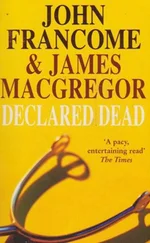He regretted he’d been so hard on Ed Browne, Sanders and Matson after he’d finished with McGovern. But, dammit, they were holding out on me . They could have petitioned to bring him, their boss, in on Century Ratchet. Another aviator thing. The frickin’ boss is kept in the dark? As a submariner he’d been read-in on dozens of classified programs. But on this one , I was excluded? By McGovern? Peterson? It was all upside down. Regardless, his subordinates had gotten the message.
Aviators . He still didn’t know what made them tick. The unprofessional familiarity up and down the chain, the routine mocking of seniors, the silly nicknames they had for each other, the questionable been-there-done-that patches on their flight jackets that served as extensions of their titanic egos. Meyerkopf had been-there-done-that, too — hiding under the polar icecap, reconnoitering a hostile patch of water, prosecuting a contact in a deadly game of cat and mouse hundreds of feet below the surface — and not an individual medal to show for it. His was The Silent Service; theirs the pop culture of movies, fraternal newsletter magazines, and look-at-meee You Tube videos of themselves. For crying out loud, Sanders has elevated dosimeter readings in his reactor compartment! While within limits, the readings did not seem to alarm him in the least. And now Washington was going to push Coral Sea to the limit, and Meyerkopf had to depend on these guys to get the job done. Shoot first then ask for forgiveness? He wasn’t going to stand for it.
He resumed watching the ships alongside as they rose and fell in formation, transferring gallon after thousands of gallons of fuel through the big hoses. The helicopter continued its graceful hummingbird back and forth between the ships, picking up and dropping off pallets in practiced routine, all of it unfamiliar to him. He realized at zero-three-hundred he needed to be asleep. Sanders could handle this.
Meyerkopf stepped inside his sea cabin and closed the door, lying down on his rack with his uniform on to catch a few hours sleep. As the CO of an attack boat, he had done the same for many years, sleeping mere feet from the control room, ready to spring into action.
(Room 4E622, The Pentagon, Washington)
The following morning, a Saturday, Chief of Naval Operations Mike Dwyer was at his standup desk wearing shorts and a golf shirt. Up since before 5am, he had worked out at his Navy Yard home before driving himself to the office where his Executive Assistant and aide — a Navy Captain and lieutenant respectively — were ready with a folder of paperwork for him to review and sign off.
It never ended. They could be on overseas travel in an airplane in the middle of the night, and the flag lieutenant would have a folder of paperwork for him. Not that Dwyer minded. He demanded it, and tried — in vain, most of the time — to keep up with it. The wrap-up last night had gone late, to almost 7:30, but he and his wife had arrived in time for the Fleet Reserve Association dinner at the Army Navy Country Club which he had graced as guest speaker.
Today, after the Navy League charity golf tournament, he had the forced-fun reception at SECDEF’s house. He would be stag because his wife couldn’t stand to be around the host couple. He cursed the fact he had promised his retired friend at the Navy League he would be there to support the tourney. All the defense prime contractor reps would be there, pawing at him for “just a few minutes” to tout their latest widget for only one billion dollars, tops, total lifecycle costs, no hidden “tail,” you can trust me on this one, and I love you no shit .
Mike Dwyer didn’t have a spare million to rub together, and all his weapons acquisition programs were over budget and on sustainment rations. And, now, with SOUTHCOM heating up, he needed to answer that demand signal — which would only chew up more service life from his tired airplanes and ships. Not to mention his overworked fleet sailors. Pete Peterson was recalling them to ships up and down the east coast. And, worst of all, he didn’t control how they were employed. Combatant Commanders, like Walt Freeman in Miami, did that and just sent the checks to him, demanding what they wanted, when and where they wanted it, and caring little how they got it.
Dwyer dove into the folder and groaned at what greeted him first: the latest admiral succession plan from “Flag Matters.” They always have a new plan needing approval , he thought.
Dwyer’s aide stepped over and interrupted his review of the folder. “Sir, General Freeman from SOUTHCOM is on the phone for you.”
Surprised, but welcoming a call from an active “warfighter,” Dwyer motioned toward the phone on his sitting desk and asked his aide to put it through. Dwyer picked up the receiver and sat back as he listened to his aide coordinate with the SOUTHCOM exec to get Freeman, the senior, on the line. He crossed his bare calves over the desk corner just as he heard the general pick up.
“Mike, Walt Freeman.”
“Good morning,General, how are you doing down there?”
“Oh, busy, monitoring the situation, assessing it. Also spending lots of time on the phone with State and, of course, the Secretary.”
“Is Pete Peterson at Fleet Forces giving you what you need? If you need another carrier, just let me know.” Dwyer then covered the phone with his hand and mouthed a question to his listening EA. What’s the ready ship?
“Oh, I’ve been on the phone with Pete, and he’s cleaning out half of Norfolk to come down here and help. He said he needs a few days and I appreciate that. Glad we already have one of your flattops in theater.”
“Yes, sir, Coral Sea is a good ship, the best we have. And the fact she’s already there and operating is a huge plus,” Dwyer said.
“Yes, it is, and that’s one of the things I was talking to Pete about. He asked me to bring it up with you.”
“Sure, what’s the issue?”
“Your guy on Coral Sea …. My task force commander and naval component commander are uneasy about him.”
With the conversation taking a more sensitive turn, the CNO sat up. His eyes met those of his aide and EA who were listening and taking notes. Dwyer’s instinct was to defend his fellow naval officer.
“Roland Meyerkopf is a capable guy, General. He follows orders. I find him fast on his feet. Is there a problem? Because I hear he’s doing good work.”
“My Navy and Marine component guys don’t think he’s the right fit for what we’re spinning up to do. Can you send me someone else?”
Dwyer was silent for a moment to consider what had just been requested. Before he could respond, Freeman continued.
“Pete says he can — and will — but he did ask me to inform you.”
Dwyer absorbed this blow to his ego. He was the Chief of Naval Operations and had “control” of who was selected for admiral and where they were assigned. But he knew, if Freeman and that bastard Pete Peterson made a “drug deal” to move a task force commander, they could. As Dwyer tried to reason with Freeman, his EA placed a sticky note in front of him: THEODORE ROOSEVELT — RDML Bill Rogers.
“Walt,” Dwyer began, dropping the formal “General” in order to talk four-star to four-star. “This is… a surprise. Roland is a fine officer who is going places, and before he even gets a shot, we pull him from command? Just yank him out? How does that look? I mean, no amount of whitewashing is going to remove the stigma of being relieved of command. How does a guy recover from that?”
Читать дальше












